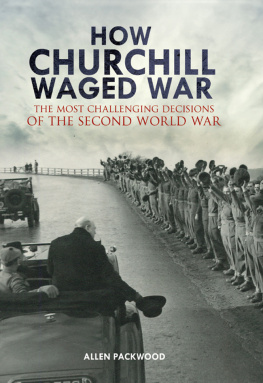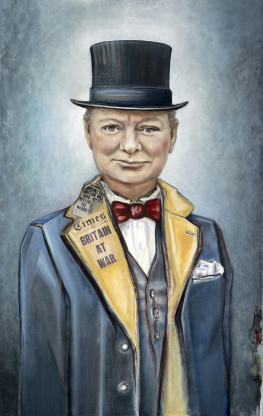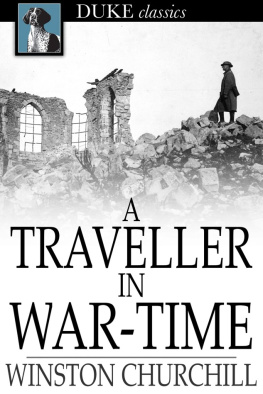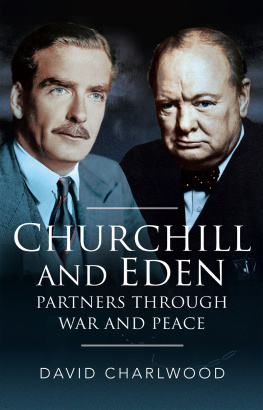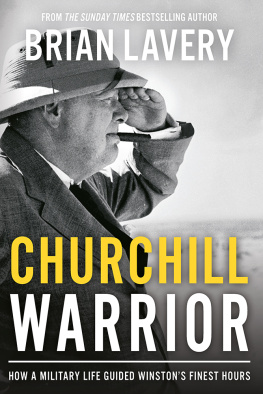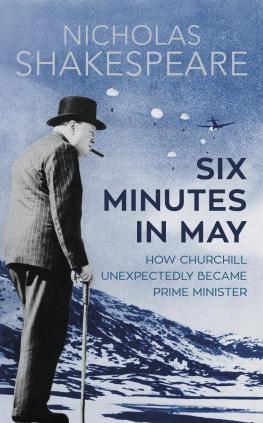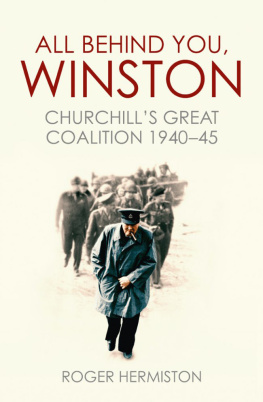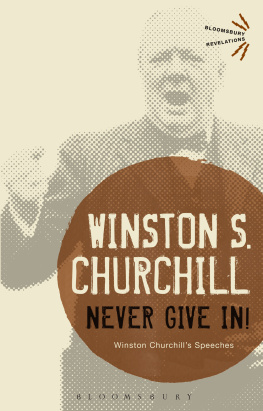Pagebreaks of the print version

HOW CHURCHILL WAGED WAR
HOW CHURCHILL WAGED WAR
THE MOST CHALLENGING DECISIONS of the SECOND WORLD WAR

How Churchill Waged War
The Most Challenging Decisions of the Second World War
First published in Great Britain in 2018 by
FRONTLINE BOOKS
An imprint of
Pen & Sword Books Ltd
Yorkshire - Philadelphia
Copyright Allen George Packwood
ISBN: 978-1-47389-389-4
eISBN: 978-1-47389-391-7
Mobi ISBN: 978-1-47389-390-0
The right of Allen George Packwood to be identified as Author of this work has been asserted by him in accordance with the Copyright, Designs and Patents Act 1988.
A CIP catalogue record for this book is available from the British Library
All rights reserved. No part of this book may be reproduced or transmitted in any form or by any means, electronic or mechanical including photocopying, recording or by any information storage and retrieval system, without permission from the Publisher in writing.
Pen & Sword Books Ltd incorporates the imprints of Pen & Sword Archaeology, Atlas, Aviation, Battleground, Discovery, Family History, History, Maritime, Military, Naval, Politics, Social History, Transport, True Crime, Claymore Press, Frontline Books, Praetorian Press, Seaforth Publishing and White Owl
For a complete list of Pen & Sword titles please contact
PEN & SWORD BOOKS LTD
47 Church Street, Barnsley, South Yorkshire, S70 2AS, England
E-mail:
Website: www.pen-and-sword.co.uk
Or
PEN AND SWORD BOOKS
1950 Lawrence Rd, Havertown, PA 19083, USA
E-mail:
Website: www.penandswordbooks.com
For Andrea, Amy and Isobel (and Tommy the black dog)
Whilst writing, a book is an adventure. To begin with it is a toy, then an amusement, then it becomes a mistress and then it becomes a master and then it becomes a tyrant and, in the last stage, just as you are about to be reconciled to your servitude, you kill the monster and fling him to the public.
Speech by Churchill at Sunday Times Book Prize, 2 November 1949 (Churchill Papers, CHUR 5/28A/7)
Acknowledgements
I t has been my great good fortune to work at the Churchill Archives Centre and be a part of Churchill College, Cambridge. I hope the reader will feel that this book proves that I have benefitted from these connections. While all errors and opinions are my own, I am grateful to all my colleagues for supporting and encouraging me. This book only exists because of the Colleges generosity in granting me a sabbatical, and I owe a huge debt to Natalie Adams, Adrian Crisp, Sarah Lewery and Andrew Riley for covering my duties during my absence.
Professor David Reynolds had been an inspiration and a mentor, and his willingness to discuss my ideas has saved me from many mistakes and pitfalls. To quote his own phrase, he has proved himself an invaluable critical friend. Needless to say, I am grateful to John Grehan and all at Pen & Sword for embracing the concept of this book.
The exercise of writing has allowed me to experience the other side of the reading room desk, and I want to thank all those who looked after me, in the Churchill Archives Centre, the National Archives, Cambridge University Library, Nuffield College and the Royal Archives. While I am naturally biased, this exercise has confirmed my conviction that archivists and librarians are the unsung heroes of the research world. Heidi Egginton, Gurnee Hart, Fiona Isles, Michael Norwich, Tony Wild and Professor David Woolner all read sections of the text and provided most useful feedback.
My thanks also to all the Churchill family, who have trusted me to write what I believe to be true, and especially to Randolph and Catherine Churchill and to Celia Sandys, who have always been supportive of this project. Material in the personal copyright of Sir Winston Churchill is reproduced with the permission of Curtis Brown, London, on behalf of the Estate of Winston S. Churchill, The Estate of Winston S. Churchill. Quotations from The Fringes of Power are reproduced by permission of Hodder & Stoughton Limited, 1985 Sir John Colville. Acknowledgements are also due to the Trustees of Lord Alanbrooke, Lord Attlee, Patrick Alymer, Anthony Bonner, Churchill College, Ian Jacob, Victoria Kelly, Lord Moran, Debbie Schlosser and Charles Tilbury. This work contains public sector information licensed under the Open Government Licence V.3.0.
My parents, Tim and Anne, set me upon this course and have never wavered in their support. This book is quite rightly dedicated to my wife Andrea and my daughters Amy and Isobel. Churchill has dominated our family life for some time, and I hope they enjoy the final text.
Introduction
At 14.54 on Monday, 13 May 1940, Winston Churchill stood before the House of Commons and delivered his first address as Prime Minister. In his remarks, which took less than six minutes, he famously declared that, I have nothing to offer but blood, toil, tears and sweat and spoke of his policy to wage war by sea, land and air with the single aim of victory: victory at all costs, victory in spite of all terror, victory, however hard and long the road may be.
This moment was later beautifully captured by Sir Edward Spears, the member of parliament for Carlisle, who recalled Churchill calmly standing, in the queer light of the House, which so often seems to trail a veil of last winters fog across the beams of the ceiling, he seemed rather white, but his jaw was set. As a Churchill supporter, Spears may not have been the most impartial witness, and by the time he was writing in the 1950s, secure in the warm glow of victory, this speech had already assumed a truly iconic status. It is now commemorated in cash on the British 5 note, which features the blood, toil, tears and sweat quote alongside the illustrated clock of Big Ben, set to 15.00 hours to mark the moment when Churchill finished speaking.
Churchill normally prepared extremely thoroughly for his great speeches. It is not unusual to find in his papers several drafts of an important address, culminating in the final blank verse speaking notes referred to by his private office as speech form. Yet, for this most important of speeches, delivered only three days after taking high office, and critical in setting the tone for his new administration, only a single page survives in his files. It begins in typescript but then, after just a handful of lines, degenerates into a hand-written scrawl that itself peters out before reaching the most famous lines. These may have included a complete final version that has since been misplaced or destroyed, or which is awaiting a triumphal rediscovery. Or perhaps Churchill was simply overtaken by events and forced to deliver the speech without having completed his notes. Either way, it is still a page that captures something of the immediacy and drama of that moment. For his words, which are only rendered more dramatic if adlibbed, marked a beginning, a statement of intent, and a declaration that Winston would wage war.
To his audience, that resolve and determination would not have been in doubt. His fellow parliamentarians knew him well enough, and had heard him often enough, to be assured of his bellicosity. What may have interested them more is what the speech did not contain; namely any detail or substance on exactly how the new Prime Minister would deliver victory. With the benefit of hindsight we know that it was achieved, and that, with it, Winston Churchill secured his place in history as an iconic figure and famous orator. Today his name is inseparable from his inspirational phrases and pugnacious image, complete with bulldog expression, omnipresent cigar and two fingered V for Victory salute. This transition from human politician to famous figurehead happened very quickly, in part encouraged by wartime propaganda. Yet, much as he enjoyed his celebrity status, it is clear that Churchill wanted to be remembered for what he did as much as how he looked or what he said.

